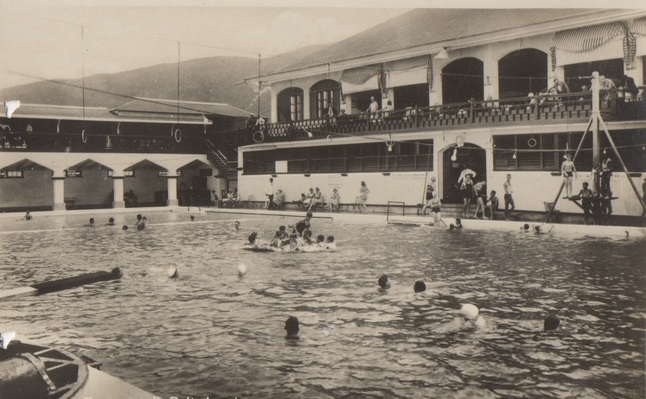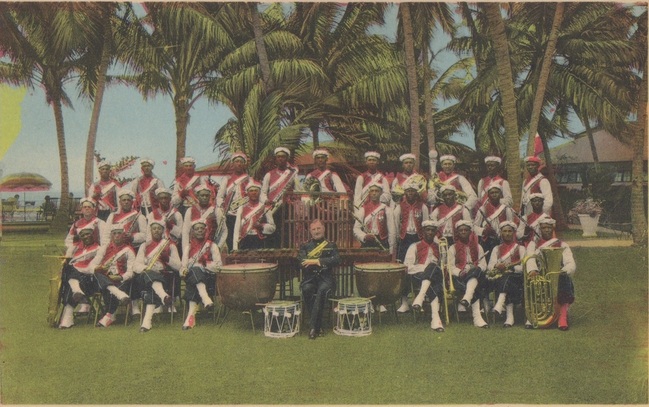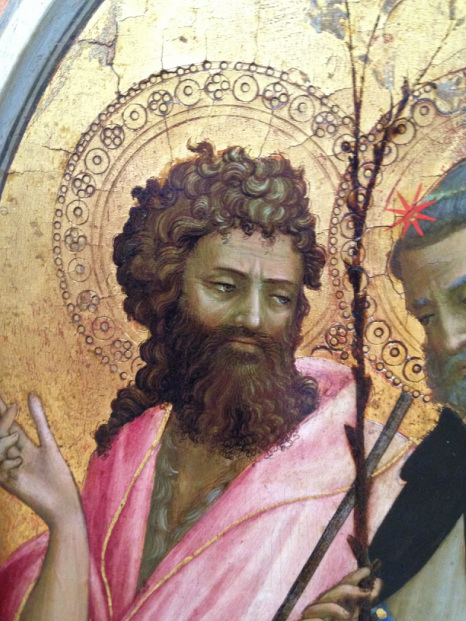|
On South Camp Road in Kingston, there is a saying - "Labour for learning before you grow old. For learning is better than silver or gold." These words have been repeated for generations by the nuns and Alpha Band Directors of Alpha Boys School. This learning involves musical instruction and many students have converted their musical education into gold - some more successfully than others. Beginning in 1892, Alpha Boys School's musical education has produced highly skilled musicians. Musicians like Joe Harriott (saxophone), Winston "Sparrow" Martin (Drums, keyboards, trumpet), Johnnie "Dizzy" Moore (trumpet), Cedric "Im" Brooks (Saxophone, flute), and Bobby Ellis (trumpet) all had their skills tapped by the bandleaders and producers of Jamaica in the 1950s and 60s. Today's youth at Alpha are ready to test their skills. Today's generation of Alpha is Sykie Campbell who at age 14, recorded with Coxsone Dodd on the Studio One album "Come Dance With Me." Sykie plays drums, percussion and xylophone and during the day walks the same dirt path to the playing field that 16 year old Don Drummond walked when he attended Alpha in the 1940s. Before her death in 2003, Sister Mary Ignatius Davies worked with Sykie Campbell. Sykie recalls his time with her: "I've been at Alpha a long time. She'd always say, ‘Lickle man, one day you're gonna be that person that's going to be tall and be a big man.' She was that type of person that show love every time she see you." The abilities of the youth at Alpha have not gone unnoticed over the years. Like a professional football coach recruits, the bandleaders and producers of Jamaica have recruited at Alpha for musicians. Sonny Bradshaw recruited Joe Harriott and Wilton Gaynair. Actually it was Alpha School's Sister Ignatius that suggested Alpha student Joe Harriott to band leader Sonny Bradshaw. Coxsone Dodd recruited Cedric Brooks, Bobby Ellis, Vin Gordon, and Headley Bennett. In a 1991 interview, Coxsone Dodd commented about his first recordings in the late 1950s and his searches for talent, "Rhythm and Blues became obsolete because of Rock and Roll. Rock and Roll didn't [go] over in Jamaica too strong, so we decided to start doing our own stuff. First of all we're lookin' for a good voice, delivery, and willingness to learn." Band leader Eric Dean recruited Rico Rodriguez, Tommy McCook, and the great Don Drummond from Alpha School. In a 2002 interview, Sister Ignatius commented on the excitement that Don Drummond created: "Even though he was still in school, he was almost the number one trombonist in the island. When the band went out on Alpha engagements, a lot of musicians would go and listen to him. Band leaders used to come ‘round and listen." Today's Band Director (since 1989) is Winston "Sparrow" Martin - an Alpha graduate himself. Mr. Martin continues the Alpha tradition by not only giving back in his role as band Director, but by assisting past Alpha Boys professionally. Mr. Martin comments, "I have a group of past Alpha boys who play at different functions, they do recordings, they travel abroad and go to places like France, Germany, Italy, to perform Jamaican music. I think it's a good thing to expose them and show them that the world is large and there are so many things you can do that will enhance you to be a better person." Youthman Sykie Campbell represents the future of Alpha - talented, capable, and driven. Sykie Campbell recalls his parting with Sister Ignatius: "I can remember when I went to the chapel. Before she died, she said: ‘Lickle man, you have grown into a big man' and I laughed with her. I remember those words clearly." Decades before, it was Sister Ignatius that introduced Joe Harriott to band leader Sonny Bradshaw. It may be that Sykie Campbell will receive his recommendation from Band Director Sparrow Martin. From here it is "upward and onward!" Educating the young men at Alpha Boys School is no easy task, but the outcome is youth with skills to survive wherever they may go in life. Where music is concerned, discipline teaches Alpha students how to play an instrument, to read music, to compose music, and to arrange music. Education is the key. When a musician is taught to read and write music, the possibilities are limitless. These great heights are expressed through accomplished musicians like Tommy McCook, Joe Harriott, and Don Drummond who are respected around the world for their musical genius. The impact of Alpha is seen in the 1930's London, England music performances by Bertie King on clarinet and saxophone. King worked with the Leslie Hutchinson Band in London - playing, writing, and arranging musical numbers. King made his return to Jamaica in the late 1950s and formed the 14 piece Bertie King's Royal Jamaicans, playing as JBC Radio's studio band. Like Stanley Motta and Ken Khouri before him, King arranged for Jamaican music to be pressed onto 78 speed records in England by Decca Records. Early 1950's Jamaican Mento music was recorded by Alpha graduate Babe O'Brien when he worked with George Moxey's band on tunes which were recorded at Stanley Motta's Studio. Babe O'Brien also played with Moxey at The Silver Slipper Night Club in Kingston. Alto saxophone player Joe Harriott attended Alpha as a youth and traveled to England in 1951. Three years after his arrival, Harriott recorded his first full length album as the Joe Harriott Quartet entitled "Cool Jazz with Joe." On trumpet, Oscar Clarke first attended Alpha in 1914-15 and as an adult toured the U.S. with Jazz legend Louis Armstrong's orchestra. Being that Clarke played the trumpet like Armstrong, it is likely that he was part of a large orchestra that utilized multiple instruments. It is unclear as to if Clarke worked with Armstrong before or after the memorable visit of Louis Armstrong to Kingston in May of 1957. Armstrong greeted thousands of Kingstonians that year when he played and sang at a free outdoor show. Alpha School overflows with graduates - many of which are not commonly known. These graduates often worked as freelance musicians, but Alpha has also produced great singers - Alpha formed a Boys Choir in 1917. Owen Gray attended Alpha School as a youth continuing his singing as a tenor at church. Desmond Dekker attended Alpha after his mother passed away and his father desired a proper education for his son. Soon after graduation, Desmond was auditioning at Coxsone Dodd's Studio One. Other students include Winston Francis, Tony Gregory, Johnny Osbourne, and even Yellowman. One of the most influential graduates of Alpha is Thomas Mathew McCook. McCook became interested in the saxophone after he saw his brother Frank playing. In response, his mother who worked at The Bournemouth Club enrolled him at Alpha in1939 (The Bournemouth Club was one of the first small clubs in Kingston and was originally called "The Bournemouth Bath"). It was not until 1940 that McCook began playing tenor saxophone under the instruction of Alpha School's bandleader George Neilson. McCook left Alpha in 1953 when he accepted an offer by Eric Dean to play at The Bournemouth Club. The same Tommy McCook went on to form The Skatalites band which played a critical role in the development of the uniquely Jamaican music: Ska. It took a full year of work by Coxsone Dodd to encourage Tommy to play for Studio One as The Skatalites. Tommy was first approached by Coxsone in 1962, but turned Dodd down. In 1963 he accepted the offer and assisted in the formation of The Skatalites. At that time mentor Sister Ignatius was looking on with a smile: "I heard them on the radio station and we also heard them practicing because sometimes they would come up here [Alpha School] and practice. Sometimes they would practice down by the sea - Bournemouth, and we would take the children down there for a sea bath." For the past 45 years Ska has been copied and duplicated throughout the world and is still building steam. It was no coincidence that when Ska was hitting big in England in 1981, Alpha graduate Rico Rodriguez was supplying the much needed Jamaican flavor with his trombone work on the number one charting song "Ghost Town" by The Specials (Two-Tone Records, 1981). The origins remain uniquely Jamaican with the Alpha Boys School signature stamp. Rich Lowe, 2007  The Bournemouth Bath, circa 1930. The Skatalites performed at this location. The Bournemouth Bath, circa 1930. The Skatalites performed at this location. .  Early photograph of The Jamaica Military Band (circa 1945). Some Alpha graduates joined the Military band after leaving Alpha. Early photograph of The Jamaica Military Band (circa 1945). Some Alpha graduates joined the Military band after leaving Alpha.
0 Comments
Your comment will be posted after it is approved.
Leave a Reply. |
Archives
March 2024
|


